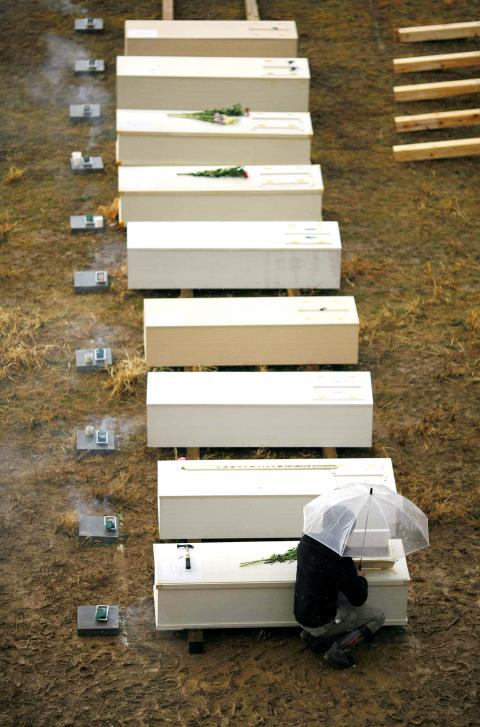Radioactivity levels are soaring in seawater near the crippled Fukushima Dai-ichi plant, Japan’s nuclear safety agency said yesterday, two weeks after the nuclear power plant was hit by a massive earthquake and tsunami.
Even as engineers tried to pump puddles of radioactive water from the power plant 240km north of Tokyo, the nuclear safety agency said tests on Friday showed radioactive iodine had spiked 1,250 times higher than normal in the seawater just offshore from the plant.
Officials said iodine 131 levels in seawater 30km from the coastal nuclear complex were within acceptable limits established by regulations and the contamination posed little risk to aquatic life.

Photo: Reuters
“Ocean currents will disperse radiation particles and so it will be very diluted by the time it gets consumed by fish and seaweed,” said Hidehiko Nishiyama, a senior official from Japan’s Nuclear and Industrial Safety Agency.
Despite that reassurance, the disclosure may well heighten international concern over Japanese seafood exports. Several countries have already banned milk and produce from areas around the plant, while others have been monitoring Japanese seafood.
Radioactive water was found in buildings housing three of the six reactors at the crippled plant. On Thursday, three workers sustained burns at reactor No. 3 after being exposed to radiation levels 10,000 times higher than usually found in a reactor.
Nishiyama said Japanese agencies were trying to work out ways of “safely bailing out the water so that it does not get out into the environment, and we are making preparations.”
He initially said the high radiation reading inside reactor No. 3, where the workers were injured, could indicate damage to the reactor. He later said it could be from venting operations to release pressure or water leakage from pipes or valves.
“There is no data suggesting a crack,” Nishiyama said. “Reactor No. 3 is the only one of the six that uses a fuel mixture of plutonium and uranium. Plutonium is the most deadly radioactive isotope.”
On Friday, Nishiyama chided plant operator Tokyo Electric Power Co (TEPCO) for not following safety procedures inside the turbine building.
More than 700 engineers have been working in shifts to stabilize the plant and work has been advancing to restart water pumps to cool their fuel rods.
Two of the plant’s reactors are now seen as safe, but the other four are volatile, occasionally emitting steam and smoke. However, the nuclear safety agency said yesterday that the temperature and pressure in all reactors had stabilized.
When TEPCO restored power to the plant late last week, some thought the crisis would soon be over. However, lingering high levels of radiation from the damaged reactors have hampered progress.
An official at the science ministry said that daily radiation levels in an area 30km northwest of the stricken plant had exceeded the annual limit. However, experts say it is still below levels of exposure from medical X-rays.
The Japanese government has prodded tens of thousands of people living in a 20km to 30km zone beyond the stricken complex to leave.
Japanese Chief Cabinet Secretary Yukio Edano said the residents should move because it was difficult to get supplies to the area, and not because of elevated radiation levels.

The CIA has a message for Chinese government officials worried about their place in Chinese President Xi Jinping’s (習近平) government: Come work with us. The agency released two Mandarin-language videos on social media on Thursday inviting disgruntled officials to contact the CIA. The recruitment videos posted on YouTube and X racked up more than 5 million views combined in their first day. The outreach comes as CIA Director John Ratcliffe has vowed to boost the agency’s use of intelligence from human sources and its focus on China, which has recently targeted US officials with its own espionage operations. The videos are “aimed at

STEADFAST FRIEND: The bills encourage increased Taiwan-US engagement and address China’s distortion of UN Resolution 2758 to isolate Taiwan internationally The Presidential Office yesterday thanked the US House of Representatives for unanimously passing two Taiwan-related bills highlighting its solid support for Taiwan’s democracy and global participation, and for deepening bilateral relations. One of the bills, the Taiwan Assurance Implementation Act, requires the US Department of State to periodically review its guidelines for engagement with Taiwan, and report to the US Congress on the guidelines and plans to lift self-imposed limitations on US-Taiwan engagement. The other bill is the Taiwan International Solidarity Act, which clarifies that UN Resolution 2758 does not address the issue of the representation of Taiwan or its people in

US Indo-Pacific Commander Admiral Samuel Paparo on Friday expressed concern over the rate at which China is diversifying its military exercises, the Financial Times (FT) reported on Saturday. “The rates of change on the depth and breadth of their exercises is the one non-linear effect that I’ve seen in the last year that wakes me up at night or keeps me up at night,” Paparo was quoted by FT as saying while attending the annual Sedona Forum at the McCain Institute in Arizona. Paparo also expressed concern over the speed with which China was expanding its military. While the US

SHIFT: Taiwan’s better-than-expected first-quarter GDP and signs of weakness in the US have driven global capital back to emerging markets, the central bank head said The central bank yesterday blamed market speculation for the steep rise in the local currency, and urged exporters and financial institutions to stay calm and stop panic sell-offs to avoid hurting their own profitability. The nation’s top monetary policymaker said that it would step in, if necessary, to maintain order and stability in the foreign exchange market. The remarks came as the NT dollar yesterday closed up NT$0.919 to NT$30.145 against the US dollar in Taipei trading, after rising as high as NT$29.59 in intraday trading. The local currency has surged 5.85 percent against the greenback over the past two sessions, central